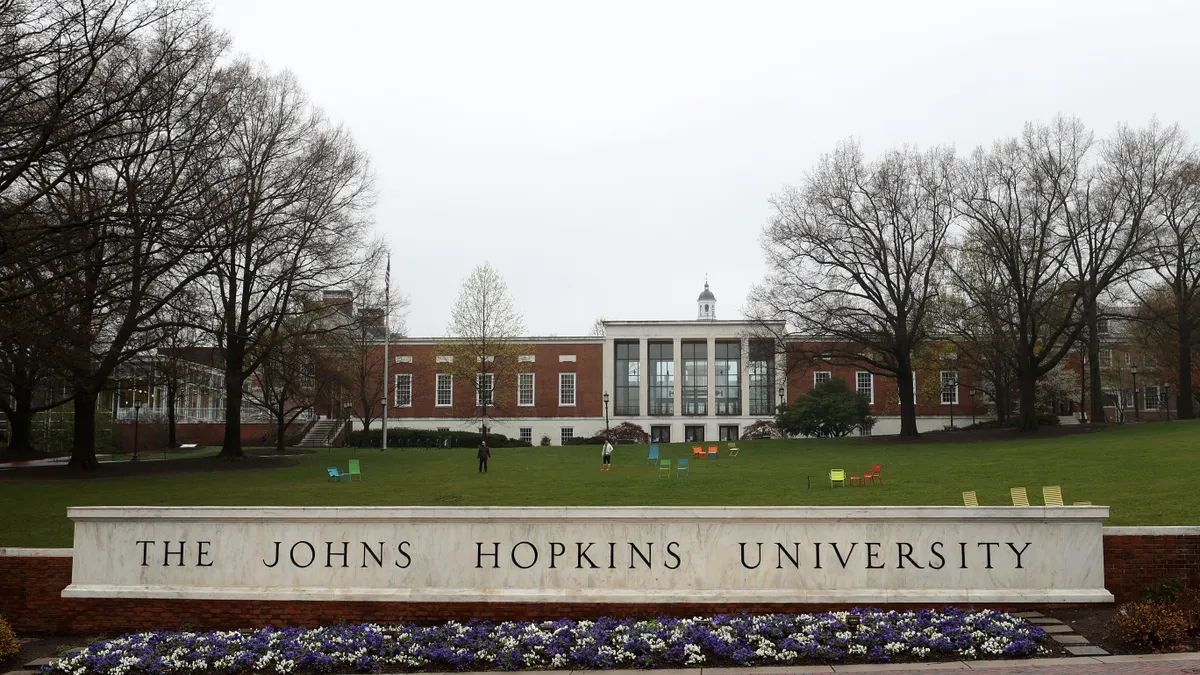Dive Brief:
- Johns Hopkins University has been added to a lawsuit that accuses more than a dozen top-ranked institutions of engaging in a price-fixing scheme that favors wealthy applicants and drives up the price of college.
- Federal law only allows colleges to work together on their financial aid formulas if they practice need-blind admissions, in which they do not consider applicants' ability to pay tuition when making admission decisions. The lawsuit, first filed last month in a federal district court, says 17 universities coordinated on their financial aid formulas even though they don't truly have the need-blind admissions policies required to be eligible for the antitrust exemption.
- Previously, the complaint only accused nine institutions of favoring well-heeled prospective students instead of adhering to need-blind policies. It didn't say whether the other seven were truly need-blind, but it accused them of being ineligible for the antitrust exemption as well because they allegedly conspired with the other institutions. But lawyers amended the complaint this week to allege that all 17 defendants, including the newly added Johns Hopkins, "systematically favored wealthy applicants," according to a news release.
Dive Insight:
The lawsuit is the latest blow against the admissions systems of top-ranked and selective universities. Many of these same institutions will also be affected by the outcome of a legal challenge to race-conscious admissions, which the U.S. Supreme Court agreed last month to hear.
The following institutions have also been named in the price-fixing complaint: Brown University, the California Institute of Technology, the University of Chicago, Columbia University, Cornell University, Dartmouth College, Duke University, Emory University, Georgetown University, Massachusetts Institute of Technology, Northwestern University, the University of Notre Dame, the University of Pennsylvania, Rice University, Vanderbilt University and Yale University.
They are all past or current members of the 568 Presidents Group, a collective of colleges formed in 1998 to collaborate on a need-based financial aid system. Johns Hopkins joined in 2021 and adopted the group's financial aid methodology for early decision applicants in the fall, according to the lawsuit.
Johns Hopkins spokesperson Jill Rosen said in an emailed statement that the university is reviewing the complaint.
"We are confident not only that we have operated fully within the law but that our financial aid and admissions practices have expanded access to a Johns Hopkins education for the highest achieving students from all socio-economic backgrounds," Rosen said. "We are proud of our commitment to need-blind admission and intend to vigorously defend this lawsuit."
The price-fixing complaint is filled with public statements from admissions officers who have said their institutions adopted practices that gave a leg up to wealthy applicants, especially those put on waitlists for admission.
One former admissions official for the University of Pennsylvania said in an op-ed last year that needing financial aid could keep a student from being admitted through the waitlist. And a Vanderbilt University official said in a 2018 waitlist FAQ that the university reserves the right to be need-aware when admitting students from the waitlist.
The lawsuit also calls out policies that favor students from families of past or potential future donors. It points to statements from former Duke University President Richard Brodhead, who said in 2006 that a family's ability to make a donation to the university was a "plus factor" in admissions.
In turn, the universities have overcharged more than 200,000 financial aid recipients by "at least hundreds of millions of dollars," the lawsuit alleges. It is seeking damages for students who enrolled in undergraduate programs during certain periods starting in 2003, received need-based aid from one of the universities, but still paid tuition or room and board. It's also asking the judge to block the institutions from coordinating on pricing and financial aid.










